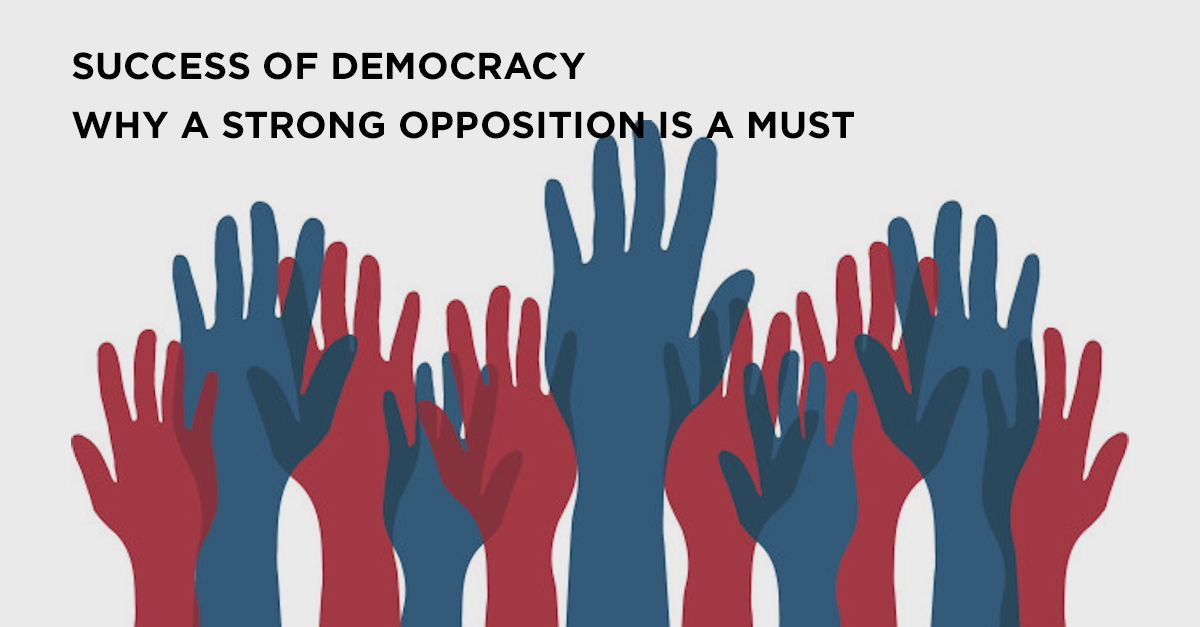British statesman and novelist Benjamin Disraeli once said, “No government can be long secure without a formidable opposition”. I truly believe so because the right opposition provides us with choices, good or bad, and as a result it gives us the power to weigh the success or failures of our governments. And despite the fact that democracy ensures we have a government of the people, for the people and by the people, its success is measured by a wise leadership and a vigilant public. The constant tug-of-war between the majority party and the opposition keeps the government on its toes and ensures good government.
Imagine a democracy that stifles public opinion, doesn’t encourage diverse views and is disrespectful of opposition. In my opinion, that’s not a democracy, but a government that borders on fascism. I feel a strong opposition exercises a healthy check on the ruling party and stops it from subjecting its people to unreasonable demands.
History has taught us that power can corrupt. So without an effective opposition any government runs the risk of turning dictatorial and unaccountable. We have seen examples of this in Nazi Germany when Hitler, without an effective opposition, displayed signs of fascism. There was powerful nationalism in Hitler’s Germany, a disrespect of human rights, controlled mass media, suppression of labour power, rampant corruption and an obsession with crime and punishment. As people who elect their leaders, we should also have the power and freedom to remove them if we feel the need to do so. The right checks and balances in society in the form of a strong opposition make the government accountable. I feel the right opposition empowers us to have choices, and gives us an alternative that would have otherwise been stifled.
I am sure many of you will remember stories of The French Revolution. The French King Louis XVII had become an absolute monarch and could only be removed by violent means, which lead to widespread death and destruction in France. So when people do not have choices, there is be bloodshed. Even in Russia, Tsar Nicholas II and his family were wiped out to usher in the revolution. This happened because the Romanovs had lost touch with the common man and ignored their welfare. So finally when the opposition came, it was in the form of the Bolsheviks who putting an end to the royal dynasty in a gruesome manner. I give these examples to stress the importance of having alternatives. When the common man is left with no choice, be it in an autocracy or a democracy, there will be huge disruptions and massive chaos, before a new order sets in.
It is essential to have an effective opposition to make democracy work for people. After all, as the great Martin Luther King believed, we are all created equal. So a government placed in power should not rise above its people. We elect our leaders to power, but we should also exercise that control so that our government works for us, is inclusive, substantive and transformative. When that does not happen, we need effective opposition to push back.
There is often a common misunderstanding that the role of opposition is limited to only opposing proposals of the incumbent government. But in my opinion that’s a very limiting view. In emerging democracies around the world, an opposition can play a role in forming policy agendas, helping with education, and fighting corruption. What stops an opposition to work in the area of good governance? I feel the real work of the opposition starts right after a General Election. Far from simply packing up and going home, a well organized opposition should now step in establish contacts and build networks with people and start the dialogue once more. They should carry the voices of the underprivileged and marginalized to the elected leaders and tell them that democracy cannot only be limited to casting ballots. The mark of a true leader is the bond between him and his people.
In many countries I have seen that opposition parties form “shadow cabinets” where members of the party are designated cabinet portfolios reflecting the incumbent government. I think this is a great idea because shadow cabinet members can now acquire and develop their own network of contacts, which will help them in good stead later. They can also develop strategies within their specific portfolios which can help them transition into a ministerial job if they are able to win the next election. Maybe this is an ideal situation, but there’s nothing wrong in having a well-trained “government in waiting”. As a potential voter I would be drawn to such a party and play an important role in it.
The very essence of democracy is dissent and debate. In India the recent elections have sparked endless debates about the health of the Indian democracy and whether the current government is actually stifling voices of dissent. I feel there is the need for a strong opposition in India that is able to act as a watchdog and ensure that the government is exercising its power with care and respecting minorities and promoting communal harmony. So yes, while I feel that elections are vital to a democracy, they are not enough to create stability in a country. Unless we have a strong opposition capable of serving as a check on our political leaders, we will be vulnerable to corruption, civil and religious unrest. No Democracy can succeed without a strong and effective opposition, and that’s what the founding fathers of our constitution have always wanted.

